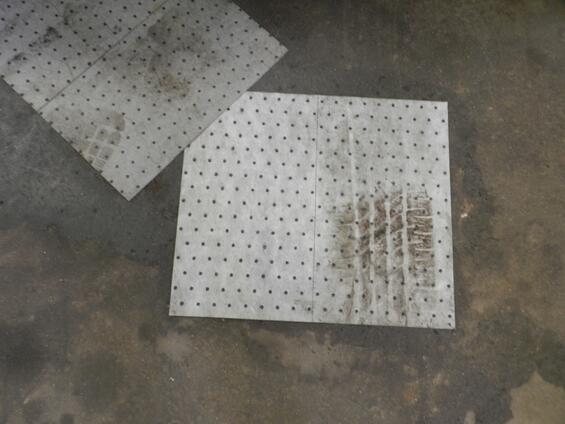Download this Fact Sheet as a PDF
Download the MassCAR Spill Prevention Fact Sheet.
Spill Prevention
Keep Containers Closed When Not in Use
Workers use many chemicals and products each day. Making sure that all containers are fully closed both reduces the risk of spills and improves your shop’s air quality by keeping chemicals out of the air. It also prevents contamination and evaporation of the product. This practice can keep your shop in compliance with air quality regulations, as inspectors regularly look for tightly-capped chemical containers.
Capture Liquids in Collection Devices
Use collection devices to prevent oil, antifreeze, transmission fluid, and other fluids from leaking onto the floor while doing repairs. See the “Vehicle Fluid Evacuation Caddies” fact sheet for your options.
Provide Secondary Containment for All Stored Liquids
By having a secondary container to catch leaks from materials or waste in the event of a leak, you can prevent serious spills from spreading over your entire shop.
Options for Cleaning Up Spills
If a spill occurs, there are various options for cleaning up moderate to minor spills that will keep your shop in compliance with regulations. A combination of these methods may work, although if your shop uses absorbent oil-collecting pads there may be little need to combine methods.
Absorbent Pads
Absorbent pads are highly absorbent sheets that work best when placed over a spill or underneath a potential drip as a preventative measure. The benefits of sorbent pads are as follows:
- Increased absorbency compared to other methods as one pound of the pad can hold an average of one gallon of oil or other liquid.
- Reduced need to purchase sorbent material because of increased absorbency (especially when compared to loose sorbents and kitty litter).
- Decreased labor time for clean-up and increased shop cleanliness when compared to the use of loose sorbents. Pads are easy to put down and pick up with little cleaning time needed as a result of their use (loose sorbents can create messes).
- Easier waste management and a possible reduction in hazardous waste disposal costs due to reduced volume of contaminated material.
Loose Sorbents
Various brands of loose sorbent (as well as kitty litter) are available for spill cleanup. They are meant to be piled onto a small spill to collect the liquid. After the spill has been absorbed, the loose sorbent needs to be scooped up and disposed of as hazardous waste.
Rags
Workers use these to pick up drops while working.
Spill Kits
If your shop works on larger vehicles, spill kits are a good way to be prepared for a larger spill. These come in varying sizes and contain multiple tools to handle a spill and prevent releases to the environment such as booms, pads and rolls, gloves, goggles, etc. Employees should know where they are kept in the shop and be trained on how to deploy the kit if necessary.
Things to Consider
Waste Management
Regardless of what method you use to clean up spills, you may have to handle the rags, sorbent pads, or loose sorbent as hazardous depending on what was cleaned up. Treat oily rags and sorbents as oily hazardous waste unless they pass the “one drop” test (meaning they will not leak oil). The rags may be able to be reused if wrung out or sent to a specialized cleaning service. See the “Common Hazardous Wastes” and “Hazardous Waste Management” fact sheets for more information on handling hazardous substances.
Sorbent Categories
Talk to a supplier about the different types of sorbents that are made for oil, antifreeze and other substances. Some sorbents are “universal sorbents” which means that they can pick up several substances.
Worker Safety
Ensure that workers in the surrounding area wear closed-toe shoes and use gloves to clean up a spill. Also make sure your shop has adequate ventilation as the vapors from the spill will reduce air quality in the shop.
Reportable Quantities of Substances
If your shop experiences a spill that is released to the outside environment, evaluate whether or not it must be reported to the MA Department of Environmental Protection (MassDEP) within the 24-hour limit. The following types of spills need to be reported:
- Oil-Based Paint – more than 1 gallon
- Paint Thinner – more than 1 gallon
- Oil – more than 10 gallons
- Power steering fluid or automatic transmission fluid - more than 10 gallons
The best way to be inspection-ready is by storing, identifying, and keeping record of the sorbents as hazardous waste unless the sorbents contain oil and pass the “one-drop test,” meaning that there is no free-flowing oil that could escape. In this case, they can be disposed of as municipal waste.

Absorbent pads can be left over even the smallest spill to continue absorbing fluid without compromising shop cleanliness.
Find Additional Information
- For general spill and sorbent information, see this United States Department of Agriculture fact sheet for Spill Response Procedures & Sorbent Materials.
- For an explanation of the “one-drop” test, see the MassDEP page for the Policy for Industrial Wipers Contaminated with Solvents
.
Contact
Phone
You will be connected to the person who can best answer your questions.